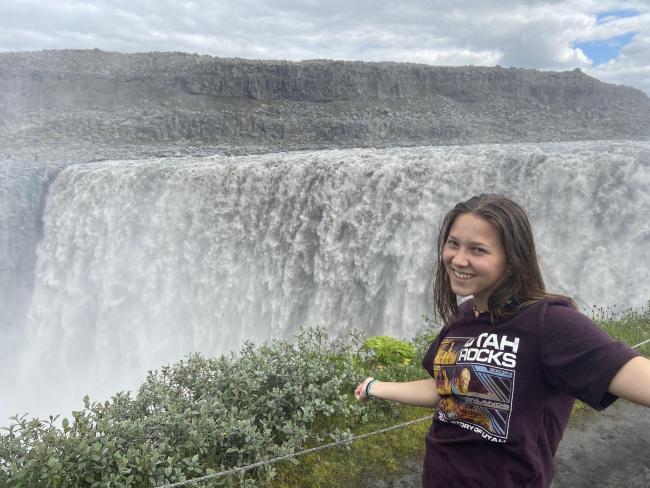This month I spoke to my friend and schoolmate, Saskia P, about the division between Arts and STEM subjects we see emerging everywhere – and the wider ramifications.
Saskia is 17, and currently studying for her A Levels: Biology, Geography and Maths, and her EPQ, which we discuss in more detail later. Saskia is passionate about Biology, which she applies particularly to plant biology and the environmental crises we face. However, this wasn’t always the case, she tells me: she began to enjoy it noticeably when she started the GCSE course and loved the content. Last year, she applied to be an Environment Captain at school, which meant becoming part of a GDST-wide Eco Society. She now uses this position to pursue real change, starting with preparing presentations for Junior Schools to spread awareness about four key areas within the climate crisis. Along with her scientific interests, Saskia enjoys finding out how biology relates to our everyday lives, and hopes to apply for Human Sciences at University. She therefore found choosing three A Levels tough, especially when she didn’t have room for History or Politics, which she also enjoys. This brings us to the crux of this article, and an idea that Saskia is fervently passionate about.
“I think it’s incredibly important – at all ages, but especially our age – to find balance and resist the polarising ‘STEM vs Arts’ divide,” she explains. For Saskia, this means attending Politics Society and Model United Nations at school, as well as writing for various school magazines, to maintain her writing skills and continue to enjoy pursuits typically associated with Humanities or Arts students. Even within biology, for instance, Saskia recognises the importance of studying both biological patterns as well as their wider social and historical contexts. “It negatively affects both sides,” she goes on, “to view them as opposites. They are both important to each other, and neither one can be valued over the other.”
One of the ways Saskia is currently taking this idea further is by introducing a STEM Journal to her school’s circulation of student-run publications. She wants to encourage the idea that students that are passionate about STEM subjects also have a place in such magazines, and to promote a multidisciplinary approach to learning. The magazine, named ‘Under The Microscope’, is “open to all students that would like to write for us,” Saskia explains. It will be a celebration of the common ground between disciplines.
At this point, she brings up the COVID-19 pandemic to illustrate her point. Saskia is critical of some elements of the UK’s response to the crisis, and in researching further she noticed that many of the UK’s politicians possess Arts or Humanities degrees. This is as opposed to Vietnam, New Zealand, or Germany – the latter of which, for example, has a leader with a degree in quantum chemistry and experience as a research scientist. “I think there’s a correlation there,” Saskia tells me. “Common to many of the countries with impressive COVID responses is a leader or leaders with a background in STEM,” whereas in the UK we tend to see politics as a profession for History, Classics or English students. According to Saskia, this needs to change – the two subjects “clearly need each other” – and it all starts in our schools.
So what can schools do to improve the situation? “I want to see more encouragement of broad subject choices at GCSE and A Level”, Saskia replies. “As a biology lover, I was very much encouraged to take Biology, Chemistry and Maths.” But this would’ve been too narrow for Saskia, and studying Geography instead of Chemistry allows her to continue with an essay subject. Saskia also thinks the individual subjects could intermingle more frequently. “We could do more writing in Biology, or write about STEM-related issues in English,” she suggests. Saskia exemplifies the latter idea in her EPQ, which is about the ethics of de-extinction. The Extended Project Qualification allows students research and ultimately write 5,000 words on a topic of interest to them. It is a good opportunity to explore interests beyond the curriculum and get experience of academic research. Saskia has “highly enjoyed” researching hers, because it straddles Biology and Philosophy, as well as allowing her to improve her writing. She tells me she’s “found it really satisfying to apply scientific knowledge to a writing task” and would “highly recommend the EPQ.” This is the kind of thing schools can encourage to break down the perceived divides between STEM subjects and Arts subjects.
Finally, I ask Saskia to explain why all of this matters, a question to which she is full of answers. “It makes you a broader thinker, for a start”, she says, “and a more rounded learner.” But the bottom line for Saskia is that students like her are the ones that will eventually take up roles within the workplace. Looking to the future, the climate crisis is likely to necessitate a larger emphasis on problem solving. “We need creative solutions,” Saskia says, “more creative brains in science and more scientific brains in politics. We need to see the two work together, of that I am certain.” And who could argue with that?

